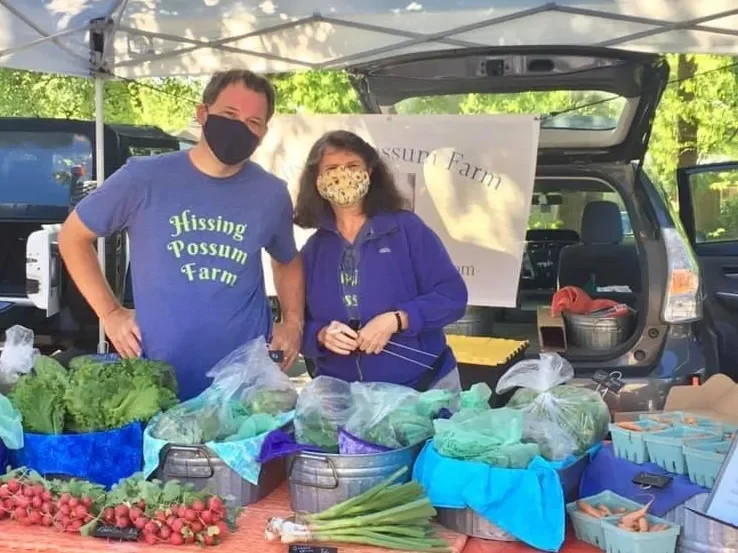Farmer Highlight: Hissing Possum Farm
February 2, 2022
When did you start farming?
We started Hissing Possum Farm officially in the fall of 2019. We are a no-till vegetable farm located on 9.7 acres in Tunnel Hill, Georgia with about one acre under cultivation.
What led you to choose farming as a career?
As it turns out, both of us have a tendency to take the long way around. That’s how we found each other, finally, and that’s what led us to farming. All of our formal education is in music, and both of us have decades of experience as performers and teachers. We both teach college music and perform frequently around the region. Neither of us set out to be a farmer. We’d been gardening for years, growing food for ourselves, and about a decade ago we got very interested in the local food movement and the value and logic behind it. We started focusing on supporting our local farmers and our local businesses, aiming to do our part to support our friends and neighbors and the community economy. We got to know the people we were buying food from, talking with them at farmers’ markets and sometimes going directly to their farms. Some of them became friends – a couple of them even helped replace the alternator in our old truck when it died at an inopportune place and time! We saw the value in what they were doing as well as our part in it. But we still didn’t think we’d ever grow food for anyone but ourselves. We were busy, and they were doing a fine job.
Then, in the course of trying to buy a little bit of land to have some space, we wound up buying nearly ten acres in Catoosa County, Georgia. Gradually, gardening that space evolved into farming, and then when the pandemic hit we realized that it was even more important than we’d thought. That’s when we started what we refer to as our “internship year” and really began to learn what it meant to farm, in contrast to the gardening we’d been doing before. It’s very different to try to produce a reliable supply of food for other people than it was to accept whatever decided to succeed in our garden at a certain time. Once we’d started down that path, we realized that we love the farming community and all of the things that go into the successful local food economy that’s growing up around Chattanooga. It’s been more challenging than we could’ve imagined, but also more rewarding.
What do you find to be the most challenging thing about being a farmer?
Managing all the variables, some that we can control, and some that we can’t, so we can deliver food to people every week. For example, the heat of summer is tough on the plants and on us. Keeping moisture levels right, dealing with weeds and pests -- all of that is most exaggerated in the summer. And we need to monitor ourselves to make sure we don’t melt! Other seasons have other challenges, and balancing everything from day to day and season to season is definitely the most difficult thing we have to deal with.
What do you find to the most rewarding part of being a farmer?
We love the creativity – the improvisational aspect of farming – and the people. We’ve met a lot of terrific people as a direct result of growing and selling our produce. Even though we still consider ourselves newcomers, we feel the farming community has embraced us, and we’ve learned a great deal from other farmers who’ve shared generously with us.
We like to research and try new veggies ourselves and when we like something we try to grow it; it’s very rewarding when that crop is successful. This past season we read about the nutritional benefit in Italian dandelion greens, so we grew them and they did really well for us. Customers really liked them, so it was a huge win for our customers and us. We love when customers see the different colors on our market table and comment how beautiful it all looks. Veggies offer such an incredible pallet of different colors and different shapes and sizes, it is really fun to play with the visual aspect of food. There is just so much beauty in food, from bright red round radishes, tapered orange carrots, green curly kale, white turnips, black eggplants, and so much more, you can really create such visually stunning meals that also taste amazing and give great nutrition to your body.
Where can we find your products?
Brainerd Farmers Market at Grace Episcopal Church Saturdays, 10am -12pm (starting April 23rd this year)
Gaining Ground Grocery (12-6 every Thursday-Saturday)
Market Wagon - order online at marketwagon.com for delivery on Wednesday (wide delivery area)
Directly from farm with arrangement
---------------------------------------------------------------------------------------------------------------------------
Growing Practices
Sustainable practices, no till, limited fossil fuel, broad fork power! While we are not certified organic we do follow organic growing practices. All of our soil amendments are all natural. Our pest management systems are organic approved. We do not use herbicides or chemicals fertilizers.
CSA: No
U-Pick: No
Payments Accepted: Credit/Debit, Venmo, PayPal, Cash/Check
Online ordering: Yes, as pre-orders for pickup at the Brainerd Market, and on marketwagon.com.
Delivery: Yes, within parameters
Winter season - pick up pre-orders at Grace Episcopal on Saturday mornings
Types of Products: Vegetables
(Seasonally) kale, collards, lettuce, malabar, spinach, turnip greens, salad mix, arugula, radishes, carrots, garlic, hakurei turnips, sorrel, mustard greens, Italian dandelion greens, cucumbers, okra, squash, tomatoes, zucchini, cucumbers, microgreens and shoots, and more.
CONTACT INFO: hissingpossumfarm@gmail.com
https://www.hissingpossumfarm.com/
Social Media: Facebook, Instagram

